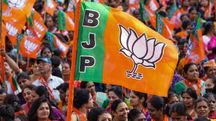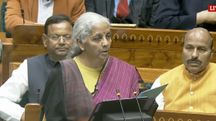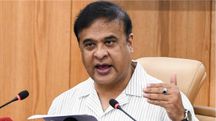Who is a hindu?: Swami Vivekananda’s Vedanta vs Savarkar’s Hindutva
 swami
swamiBY AXOMSON
157 years ago on this day, a wandering monk was born in this country whose philosophy and works are very much relevant in modern India. Narendra Nath Datta, born in an aristocratic Bengali family, later became famous as the patriotic monk Swami Vivekananda.
He is the one credited with bringing Hinduism among the count of major religions of the world. This, he achieved by speaking at the World’s Parliament of Religions in Chicago 1893, where he was greeted with thunderous applause for his speech that starts with “Sisters and Brothers of America” and is popularly known as The Chicago Address.
ALSO READ: No Bargain with Centre on CAA: AASU’s Samujjal Bhattacharya
Apart from this he is also the pioneer of popularizing Hinduism as a culture and a way of life through his efforts to disseminate knowledge about Yoga and his philosophy of modern Vedanta.
Ten years after his death, Vinayak Damodar Savarkar wrote in his book “The essentials of Hindutva” that proposed and formulated his philosophy of Hindutva. His book was highly revered by a section of the society and has been held as a holy scripture to guide the works of many social and political organizations that came up in modern India including the Hindu Mahasabha, Vishwa Hindu Parishad, Rashtriya Swayamsevak Sangh and Bharatiya Janata Party. All of these organizations are now included in an umbrella group that is commonly referred to as the Sangh Parivar or The Family of RSS. These organizations have become the face of the hindu nationalist movement of the country and stick to their adherence to Savarkar’s Hindutva.
ALSO READ: Karbi Anglong Girl Puja Basumatry Bags First Gold for Assam in Khelo India Games
The Sanghis (common term for the followers of the Sangh Parivar) have stood on the shoulders of India’s historical giants like Bankim Chandra Chattopadhyay, Sardar Vallabhbhai Patel and Swami Vivekananda and come to term their philosophies as a precursor to their own. They have called Vivekananda’s Vedanta to be on parallel grounds with Savarkar’s Hindutva. But a close look at both philosophies bring forward stark dissimilarities between the two.
To understand Vedanta, one must look at the concept behind Hinduism. The Rig vedic concept of Hinduism is not a religion but a way of life. It has developed through its concepts of tolerance and assimilation by virtue of which, throughout the years it has continued to accept as its own many tribal and pagan customs as well as tantric religious practices that have formed the basis of the Hindu religion. That is the prime reason why Hinduism has grown to possess 33 Crore deities. Hinduism does not have a formal declaration of faith or a creed and thus it is a perfect example of the plurality of religious phenomena in India.
ALSO READ: Ranveer Singh Unveils New Character Poster of Upcoming Film '83'
These original ideas of Hinduism are clearly reflected in Vivekananda’s works and speeches. He was strongly opposed to the strong attachment of people to one particular sect to the amounts of force and violence. He was of the opinion that true Hinduism lies in allowing all religions to flourish in all their symbiosis. He was very vocal against the conversion of religions irrespective of conditions. This he applied to conversion from Hinduism to other religions as well as from other faiths to Hinduism.
By his own words in the Chicago Address on 11th September 1983, “Sectarianism, bigotry, and its horrible descendant, fanaticism, have long possessed this beautiful earth. They have filled the earth with violence, drenched it often and often with human blood, destroyed civilization and sent whole nations to despair. Had it not been for these horrible demons, human society would be far more advanced than it is now. But their time is come; and I fervently hope that the bell that tolled this morning in honour of this convention may be the death-knell of all fanaticism, of all persecutions with the sword or with the pen, and of all uncharitable feelings between persons wending their way to the same goal.” This day is now celebrated as Universal Brotherhood Day.
ALSO READ: CAA won't affect Northeast States: PM Modi in Bengal
In his address at the final session of this convention, he said, “If any one here hopes that (this) unity will come by the triumph of any one of the religions and the destruction of the other, to him I say, "Brother, yours is an impossible hope." Do I wish that the Christian would become Hindu? God forbid. Do I wish that the Hindu or Buddhist would become Christian? God forbid. If anybody dreams of the exclusive survival of his own religion and the destruction of the others, I pity him from the bottom of my heart, and point out to him that upon the banner of every religion will soon be written, in spite of resistance: "Help and not Fight," "Assimilation and not Destruction," "Harmony and Peace and not Dissension."”
Unlike most other religions, Hinduism has no clear founder. So the true definition of Hinduism and Hindus have been interpreted by many people in their own ways. Savarkar, an atheist by his own declaration, has propagated his theory of Hindutva as a nationalist theory of the Hindu Rashtra (Hindu Polity).
ALSO READ: Khelo India: Odisha’s Dinesh Kumar Bags First Gold in Cycling
According to him, the term Hindu should come to be associated with true citizens of the Hindu Rashtra. This identity of Hindus he has extended to the followers of other faiths that trace their origin to Hinduism like Sikhism, Jainism, Lingayats etc. But this propensity of kindness towards other faiths is not visible in case of other religions which have an independent source of origin and this is where Vedanta and Hindutva are of stark contrast.
Savarkar has been adamant of including only those people in the hindu rashtra who refute the unique principles of their faith and accept their origins from Hinduism.
This is reflected in his book “Essentials of Hindutva” where he writes, “It may be that at some future time the word Hindu may come to indicate a citizen of Hindusthan and nothing else; that day can only rise when all cultural and religious bigotry has disbanded its forces pledged to aggressive egoism, and religions cease to be 'isms' and become merely the common fund of eternal principles that lie at the root of all that are a common foundation on which the Human State majestically and firmly rests. As long as every other 'ism' has not disowned its special dogmas, whichever tend into dangerous war cries, so long no cultural or national unit can afford to loosen the bonds, especially those of a common name and a common banner. For although the first requisite of Hindutva is that he be a citizen of Hindusthan either by himself or through his forefathers, yet it is not the only requisite qualification of it, as the term Hindu has come to mean much more than its geographical significance.”
ALSO READ: Nagaland Governor RN Ravi Demands Police to take Stringent Action against Extortionists
These statements clearly reflect the difference between the two philosophies. While Savarkar’s view of Hinduism stems from radical nationalism that is very particular about it’s choosing, Vivekananda’s Vedanta is an all-encompassing notion of assimilative spiritual identity that allows for individual prosperity along with an ideology of symbiotic freedom.
Swami Vivekananda’s birthday, the 12th of January is celebrated in our country as National Youth Day because of his focus on the youth being the backbone of the country’s future. He was a visionary who famously said, “We are responsible for what we are, and whatever we wish ourselves to be, we have the power to make ourselves. If what we are now has been the result of our own past actions, it certainly follows that whatever we wish to be in future can be produced by our present actions; so we have to know how to act” There is no doubt that his voice needs to be heard and properly interpreted in today’s India.
Support Inside Northeast (InsideNE), an independent media platform that focuses on Citizen-centric stories from Northeast India that are surprising, inspiring, cinematic and emotionally relevant.
Readers like you make Inside Northeast’s work possible.
To support our brand of fearless and investigative journalism, support us HERE.
Download:
The Inside Northeast app HERE for News, Views, and Reviews from Northeast India.
Do keep following us for news on-the-go. We deliver the Northeast
Copyright©2026 Living Media India Limited. For reprint rights: Syndications Today









